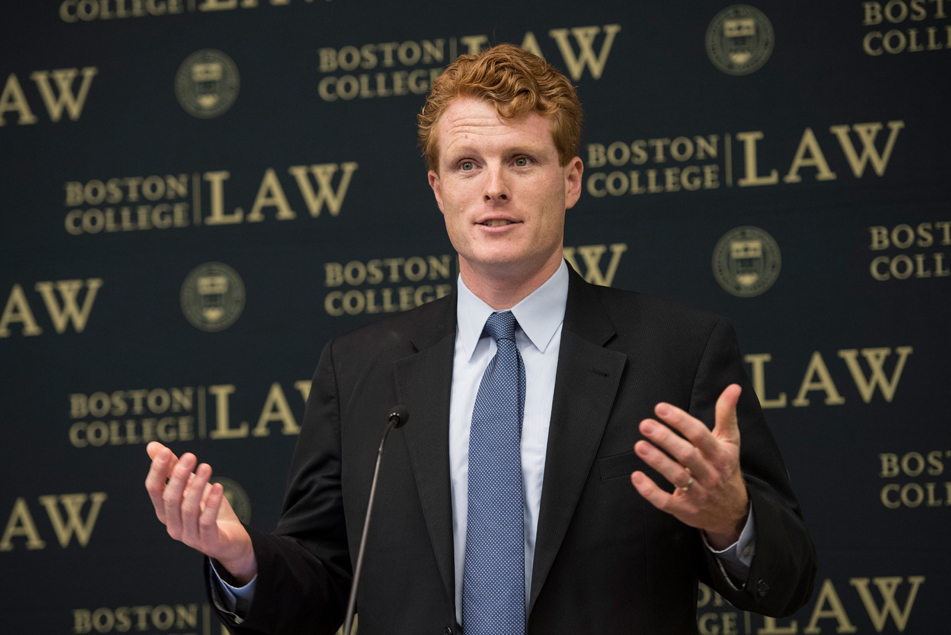Congressman Joseph Kennedy III, who began his time in public service as a Peace Corps volunteer in the Dominican Republic after graduating from Harvard Law, harkened back to his clinical experiences at Boston Housing Court during law school to explain the importance of making legal counsel affordable, and the tragedy for those who couldn’t find it.
“Often, the people we would work with—and those we couldn’t—were fighting to protect their apartment because the landlord couldn’t keep up on the building’s mortgage, and you could see it in their eyes,” he told the audience during a visit to BC Law October 11. “Our justice system is supposed to be the backstop, the equalizer and counterweight in a society that too easily slides towards power and privilege. But, today, a single mother or homeless veteran wanders into court, buffeted by circumstances, with no hope of a system that can offer them justice. There is this asterisk of ‘equal justice under law’—if you can afford it.”
The Congressman noted a number of ongoing initiatives to address the issue in the House of Representatives, including increased federal support for public defenders and a bipartisan caucus. But said the country must do much more with criminal justice reform, as well as inequities in civil matters like eviction, domestic violence, and workplace discrimination. For illustration, he rattled off a string of statistics showing the difficulty those coming out of prison might face—to secure housing and a job with a living wage, to get insured (particularly with any past substance abuse), and even to receive public assistance.
“Seventy million people have criminal records today. For them, civil protections are critical and yet the bright line between civil and criminal often fades away,” Kennedy said. “We create a mutual assurance that the already disenfranchised are disenfranchised still further.”
Another example he cited, borrowing from the New York Times, was on the criminal side: a public defenders unit in Louisiana that ceased taking cases and asked the federal government to sue it for being constitutionally deficient in its services. “They highlighted a capital case they didn’t take, where the defendant was proven innocent of murder charges against him by a videotape that private counsel was able to secure before 30 days, when it would’ve been erased.” Had the case stayed with the overwhelmed public defender, it would’ve been too late for him, Kennedy explained.
“There are a number of things we can do to cope,” he continued. “Obviously on loan forgiveness, to incent talented lawyers to join public defenders’ and prosecutors’ offices, or like we did when I was in the Middlesex County DA’s office, which had an ongoing program to bring in senior associates from Ropes & Gray for a year—lawyers who had more experience than most people in our office, but had never seen court. There are creative ways to go about doing this, if the will is there.”
Taking questions from the audience, Kennedy also pointed out why many Americans are frustrated with the political process, noting that constituency service—a famous strength of his uncle, the late Senator Ted Kennedy—is crucial.
Constituents care about keeping food on the table, their kids in school, and saving for retirement, Kennedy said. “Donald Trump’s plans aren’t the right solution, but [voters] have seen five-point plans from smart people in the Acela Corridor forever, too, and they’re not convinced that’s going to do it either. With this campaign, we have to speak to that frustration: understand what ails those communities that feel they’re left behind, communicate better, and establish trust with them,” he argued.
“Even with good data, you need credibility, and our office sees helping folks with legal services as part of that link. You serve your constituents whether they like it—or you—or not,” Kennedy continued. “So many lifelong Republicans tell me they voted for my uncle because he would get the Department of Defense to increase body armor allotment for a son overseas, or their grandmother with a Medicare dispute, or the IRS. That’s the stuff they remember.”
In the end, Kennedy struck an optimistic, and imperative, tone. While there is a “dangerous fraying” of public trust in law, he said, young lawyers are there to repair it.
“No matter where your career takes you, find a way to offer skills to those who need it most,” he said. “Consider public service, give back and volunteer. At a time when countless Americans are struggling to access basic rights and protections under our laws, your legal education is our insurance.”
By Tim Bourgaize Murray ’19
Photograph by Christopher Soldt, MTS, BC


